Of the four feature films that he’s made, three of Srdan Golubović’s works have been screened at the Berlin Film Festival. The latest is Father, which opened this year’s 48th FEST in Belgrade. This director was just five years old when his father gave him his first camera, and he shot his first film! His childhood superhero was Bata Živojinović, his personal idol from the ‘90s was Srđan Aleksić, to whom he dedicated his film Circles, while his latest film is dedicated to his father, Predrag Golubović
As a child, Srdan Golubović, 47, wanted to be a basketball player, and when asked long ago which historical personality he best identifies with, he replied to the author of this text:
With Njegoš, of course. Like every proper Montenegrin!
He was just four when he asked his father, director Predrag Golubović, to buy him a movie camera. His father set a condition, and Srdan fulfilled his promise and received a Super 8 film camera. So at the age of five, he shot his first film, on one roll of a Super 8:
“I shot it in Pula, the main part took place in an empty Pula Arena, and acting in the film is Bata Živojinović. By the time I was 18 I’d made about 15 films, mostly on VHS. I had two VHS recorders, and I would then edit films by re-recording parts of frames that I wanted to include in my film from one recorder to the other. I still have some of these films on some VHS tapes, but unfortunately, I lost the majority of them somewhere. My first film with Bata still stands on my desk, developed on a small 8mm roll. I’ve been planning to transfer that material to some hard drive for a long time. And my father wasn’t very happy that I had such a desire to deal with film.”
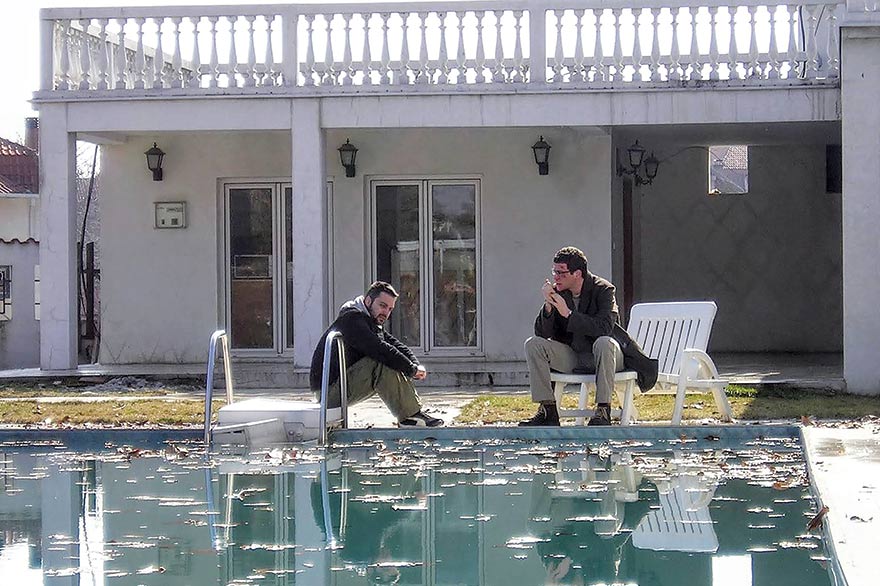
Of the four feature films made by this director, three have been screened at the renowned Berlin Film Festival, within the Panorama programme, and each of them received great attention from the audience and critics. The most recent, Father, is the story of a man who is left without work, whose wife is led by powerlessness and poverty to attempt to commit suicide and ends up in a neuropsychiatric clinic, and whose children are given over to a foster family because he has no fixed income to support them. And that’s where his fight begins with the Centre for Social Work in his city, with a torturous walk on his way to Belgrade, where he seeks justice from the responsible minister…
After being screened in Berlin, Father went on to open this year’s 48th Belgrade FEST. It won the Ecumenical Jury Award and the Audience Award in Berlin and was the most sought-after film at FEST. This director and screenwriter got the idea for this bitter story five years ago:
“I read the story of Đorđe Joksimović, a man from Kragujevac whose children were taken from him by the Centre for Social Work and who headed to Belgrade on foot in order to strike in front of the Ministry of Labour and Social Policy. I found that story very interesting; it reminded me of Wenders’ Paris, Texas. It intrigued me a lot, and I saw that it had film-like qualities within it. I talked to the mentioned hero, hung out with him, and slowly began assembling the parts. Nebojša Glogovac was supposed to play the lead role, but what happened [Glogovac died in February 2018 at the age of 48], and I postponed recording for six months. I chose Goran Bogdan instead of Nebojša, but due to his age that also implied changing the script in some segments.”
Srdan grew up in a film world family, given that his father was also a film director, and his first memories are connected to the film festival in Pula, to the huge and wonderful Arena, to their apartment on Palmiro Togliatti Street in New Belgrade, which was always full of directors, actors and people from the film world:
“My mum graduated in English, but she worked in foreign trade and devoted her life completely to her family; to my brother, who was unfortunately born with down syndrome, and me, and to whom mother was always fully devoted, as she is today. I was surrounded by artists and fascinated by that world. Kids easily learn and accept that sense of freedom, conversations about beauty and something irrational. That’s presumably why I have never had a dilemma about what I wanted to deal with in my life. I fantasised about that world, seeing in it only these wonderful things. It was later that discovered those other things.”
We are a small country and every film that enters one of the big festivals represents a great success
He spent the most time with his grandmother, his father’s mother, an old Montenegrin lady. His parents were working, and he didn’t want to go to nursery school:
“Gran was a strong, colourful woman. She was born in 1900, so she was already an older woman at that time. She lived a long time, all the way until my own father died in 1994. That was something she couldn’t bear; she was healthy and lucid, but she just decided to stop eating, to lay down and slowly extinguish herself. She was left without a husband at the end of World War II and raised three children on her own. She was the dominant figure in the whole family; everyone from the neighbourhood came to her for advice. She was like some Mafia boss. She raised me, quite traditionally and strictly. I’m grateful to her for that. And also for my love for Montenegro, which I learned from her!”
He recognised very early on what his father did for a living, firstly by attending smoky conversations in the house, as well as endless stories about the film at the Pula festival. And most of all, through his parents’ socialising with people from that world:
“Bata Živojinović was one of my father’s best friends, and I was fascinated by Bata. Sometimes my parents would take me to Bata and his wife Lula’s place in Koraćica and leave me with them for a few days. I was taken care of by their children, Miljko and Jelena, and I was in charge of fetching wine from the cellar for Bata and his company. I walked plenty of kilometres daily. I adored Bata. And I recall that in his yard I met some other wonderful, vibrant people, like Boris Dvornik or Šiba Krvavac.
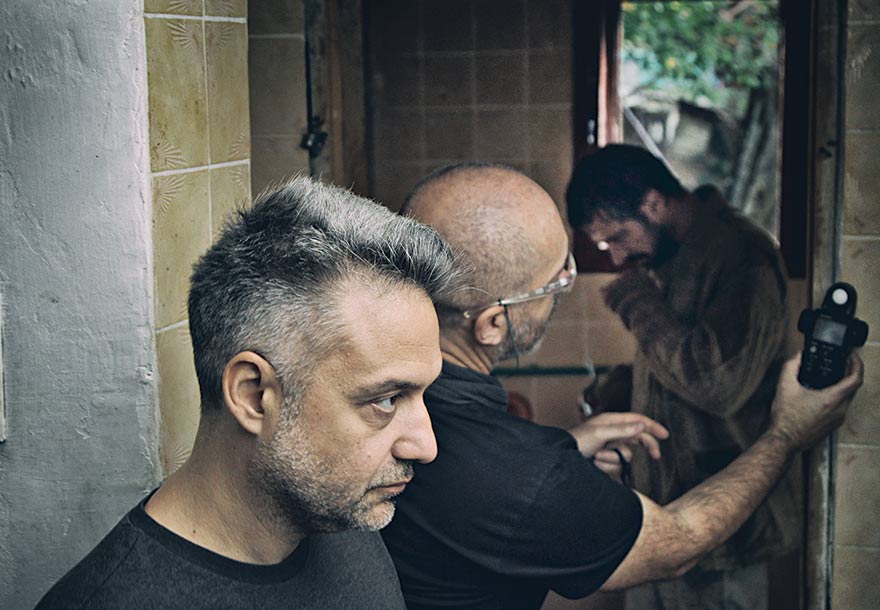
“My father was always my role model. It was because of him that I fell in love with film, because of him that I trained basketball. He was a basketball player; he’d been part of the Budućnosti team from Podgorica that won the championship of Montenegro for the first time. I imitated him and probably subconsciously wanted to be like him. I was very attached to my father. He travelled frequently and often wasn’t there. That presumably intensified my love for him. Interestingly, when I started making films, back in college, I tried really tremendously to escape my father’s shadow; to make my own world, special and different.
“Bata was the hero of my childhood. The heroes of other kids were Superman or who were other superheroes at the time? I don’t remember any more. My superhero was Bata. And when I started to follow the film more seriously and discover directors that I love, my first favourite director was Miloš Forman. I was in the sixth or seventh year of primary school when I first watched One Flew Over the Cuckoo’s Nest. I don’t recall having ever being so excited and fulfilled after some projection. After that film, I was absolutely certain that I would work in film.”
Producer Jelena Mitrović is this director’s wife and collaborator, and together they have an eight-year-old son, Balša, who’s in his second year of primary school. Asked if Balša knows what his father does for a living, CorD’s interviewee replies:
“He knows what I do, and I’m afraid he’s blinded by the same things that fascinated me at his age. I hope, however, that he will do some more secure job. But that’s his thing and his choice. He was at the premiere of Father; he watched the film, and I think he was very proud of his parents.”
My father was always my role model. It was because of him that I fell in love with film, because of him that I trained basketball
Srdan had the good fortune of being lectured on screenwriting in the fourth year of his studies by Živojin Pavlović, and by Gordan Mihić in his third year. He heard many wonderful and inspiring stories from the two of them:
“Our chief professor was Radomir Bajo Šaranović. He was a measured, systematic, genuinely great professor. I am very grateful to him. And Darko Bajić and Goran Marković had the biggest influence on me. Marković was very strict, and years later, I realised how much we learned from him. Darko was Šaranović’s assistant; we spent most of our time with him. He was the first to give me a chance to work, who believed in me and was my support and keeper for years.”
When he thinks of the Yugoslav film industry to which his father, professors and father’s friends belonged, he considers the greatest success as being the fact that Yugoslav film had incredible continuity:
“Every year we had a film in the main programme at Cannes, Venice or Berlin. Or at each of these great festivals. Yugoslav cinematography was one of the largest in the world. Huge, brave and special. We should be happy that we belonged to that cinematography and culture.”
Srdan’s first feature film, Absolute 100, enjoyed huge success, and it is interesting how the author explains why that film was important to him:
“The first film is probably the most important. As Goran Bregović would say, you spend your whole life preparing for the first record, while for the second you have only a year or two. I agree with that statement. A director includes all of his dreams and misconceptions in his first film. That’s why the first film is often the most authentic. After that calculations begin, consciously or unconsciously. And there is an interesting statement of Goran Marković, who says that a good debut film always brings some world that we’ve never seen before.”
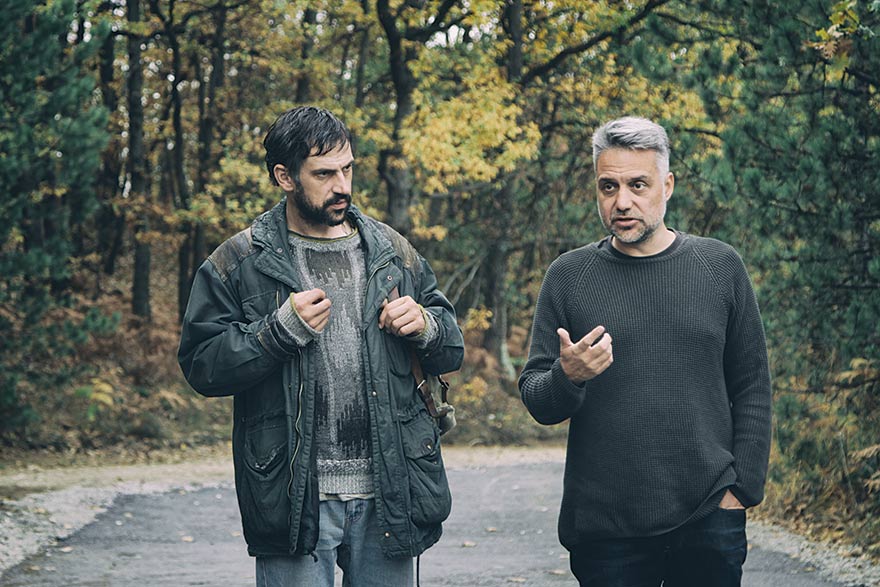
Next followed the film The Trap, then Circles. He says that he had to make Circles… because of his own view of the world and life; because of his understanding of humanity and courage. It was in this story that he found his personal hero of that time, Srđan Aleksić. And in that, he somehow discovered some distant meaning in that terrible war and those terrible times. We should recall who Srđan Aleksić was. It was on 21st January 1993 that a group of members of the Republika Srpska Army were checking the legitimacy of people at the Trebinje market. After establishing that one of the people whose legitimacy they’d checked was Alen Glavović, a Bosniak and Muslim, they started harassing and beating him. Srđan leapt to the assistance of Alen, “whose only fault was contained in his name”. Then four soldiers, in front of passers-by and police, beat Srđan to a bloody pulp with rifle butts. Srđan fell into a coma from the beating he received and died on 27th January 1993. Aleksić was just 26 when he died.
Golubović dedicated his new film, Father, to his own father, Predrag Golubović:
“I’ve spent my whole life running from my father’s influence, and now was the time to come back to him. The last sequence of the film is a dedication and homage to his short film U predahu [In a Pause]. To me, that sequence is key to the film, emotional, philosophical and poetic. I almost shot the entire film because of that scene.”
I hope that we’ll learn something from all of this around the virus. About solidarity, about the nonsense of greed for material things
This film actually represents the harshest critique of a society in which the main hero fails in his fight with the system:
“I didn’t try to portray reality as being worse than it is. Unfortunately, that reality is what it is, just as the scenes of this beautiful and torn apart country are what they are. While touring Serbia to look for filming locations, I realised how much systematic work had been done here to destroy anything that could be destroyed. And what has ultimately been completely destroyed is the man; the dignity and any integrity of the individual. Here we live in some protected zones; we have our own comfort from which we can talk about freedom, dignity, ethical issues. However, the individual I’m talking about is doomed to only one thing – survival. This hero of mine isn’t someone who fights against the system; he isn’t on the trail of freedom or seeking dignity; he doesn’t have the luxury of thinking about that. He fights like an animal to survive and to get back the only things he cares about, his children.
“On the basis of his example, we can see what it looks like when Ottoman corruption and British bureaucracy are merged into one system. My film is directed towards this society, and it can be clearly seen what this society has done to an ordinary man. Few such societies are so shattered to their core, I would say to the root. Still, it seems to me that the position of the common man is also terrible in some other systems. However, our reality is much more irrational and crazier than the films we make. And in this film, I just tried to follow life. And reality. Although today reality has become so decadent and unbelievable that we – here I mean directors – actually can’t really catch up. No fiction can achieve the extent of the irrationality of that in which we live.”
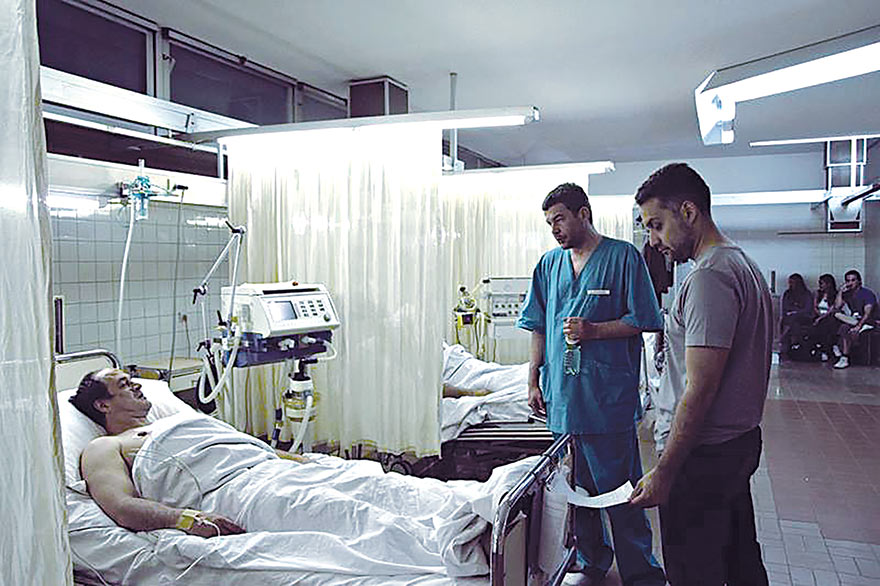
Just as we look at many things with prejudice from our small environment, so the big film world looks at us, at Serbian cinematography:
“The only thing we watch from here without prejudice is an American film because that popular culture is something we grew up on. In my film Father, I was radical and closest to my first film, Absolute 100, in what is called going to the end without any calculations.”
Major festivals have their own policies that don’t relate only to the quality of a film, but also to some other criteria. And we are a small country that’s no longer interesting either geo-strategically or politically. Does Srdan think that Serbia was more interesting to that world 13 years ago, when his film The Trap was being shown in Berlin?
“No, I think it was most interesting during the time of Milošević. Serbia was then a marked and isolated country from which some strange people came, and that had some kind of intrigue. We are now totally uninteresting, non-intriguing, and I don’t think we’re even aware of that. We’re not aware of the truth that we don’t belong to some great culture for a film coming from here would be eagerly awaited by someone there. We are a small country and every film that enters one of the big festivals is a great success. In the time of Yugoslavia, almost every year we had a film at Cannes, Venice, Berlin… But that was a big country and an important country; a country with great cinematography. Serbia is today at the tail end of Europe in every respect, politically, economically and culturally.
The greatest success of Serbian cinema today is that we are still present. And that our films are diverse; that they are not from the same kitchen. That was always a characteristic of Serbian film
“We have the black wave, which I think is a kind of reference to that cinematography that was courageous, politically provocative, and had within it a need to paint the world as it is. We already have some films in which one can see the influence of the black wave, and I think there are ever more of them. It’s also in this context that I see my own film. However, the greatest success of Serbian cinema today is that we are still present. And that our films are diverse; that they are not from the same kitchen. That was always a characteristic of Serbian film. That’s good. And I think every film that enters a major festival today has achieved a huge success. We can’t measure our achievements and successes against those of the former Yugoslav film, at least not at the moment. That was another time and different circumstances.”
If you live in Serbia and are involved in art, it’s impossible for you not to have a political stance. That might be possible in Norway or Switzerland, but in Serbia, it’s simply impossible:
“My first film, Absolute 100, was attitude. It was a shriek, rage, in relation to the time in which we lived. And youthful energy that opposed the system in which we lived. I think The Trap is a more mature emotion, a disappointment. My personal disappointment that we weren’t living better in this country six and a half years after 5th October 2000, but not because we aren’t wealthier, rather because we’re not better people. And that’s the biggest tragedy to have hit us as a society because we haven’t admitted to ourselves that we’ve done some bad things. The path to acknowledgement is the path to catharsis, and the path through catharsis is the way forward.
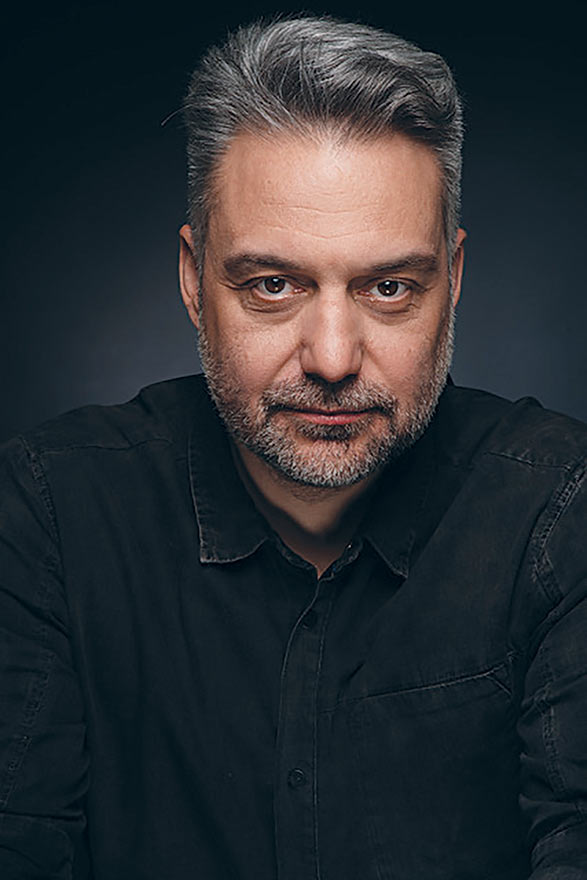
The reform of society isn’t only the reform of a socio-economic system; rather it is primarily a reform of the moral and essential values of a society. If that doesn’t happen, society cannot move forward. The Trap is my great disappointment due to that which until then had not happened in Serbia, and in that sense my film is also my political stance. Or, more precisely, my human stance. I’m not sure that’s seen in precisely that way from outside.
“The more I’m involved in this business, the less I understand and know about what reaches the audience, the festivals, the selectors… When making this film, I tried not to deal with that, rather I tried to make a film that has no compromise, and that goes all the way to the very end in depicting this world. And what will be will be. And that was my attitude.”
And which directors does Srdan love?
He says that Kieślowski is very important to him and that he loves Bresson, Bergman, Wajda… And Tarkovsky, of course:
“I really like Yugoslav film, alongside which I grew up. Saša Petrović, Žika Pavlović, Makavejev, Lordan Zafranović, Vlatko Gilić. I adore Ante Babaja’s The Birch Tree and Bata Čengić’s Playing Soldiers. Among contemporary authors, I love Andrey Zvyagintsev, Lee Chang-dong, Lucrecia Martel, Valeska Grizebach, Cristi Puiu, Sergei Dvortsevoy, Kantemir Balagov, Kleber Mendonça Filho… And many more, very diverse.”
Unfortunately, the Corona virus happened to arrive in Serbia at the time when the film Father was due to hit cinemas in the country and around the world. And it is unavoidable to ask how many problems it has caused for the film crew, primarily for the director:
“It caused problems; it completely halted distribution, but also festival life. But it’s stupid for us to complain. Terrible things are happening around the world. And I hope that we’ll learn something from all of this. About solidarity, about the nonsense of greed for material things.”